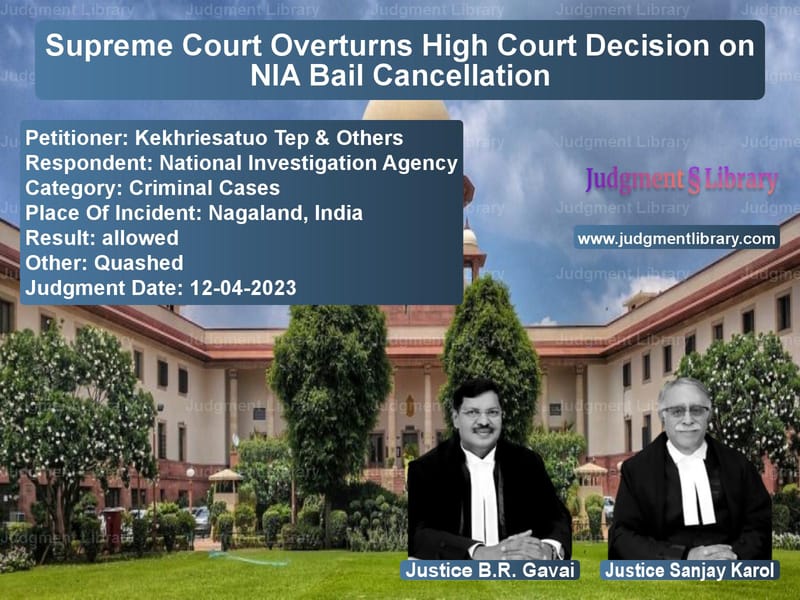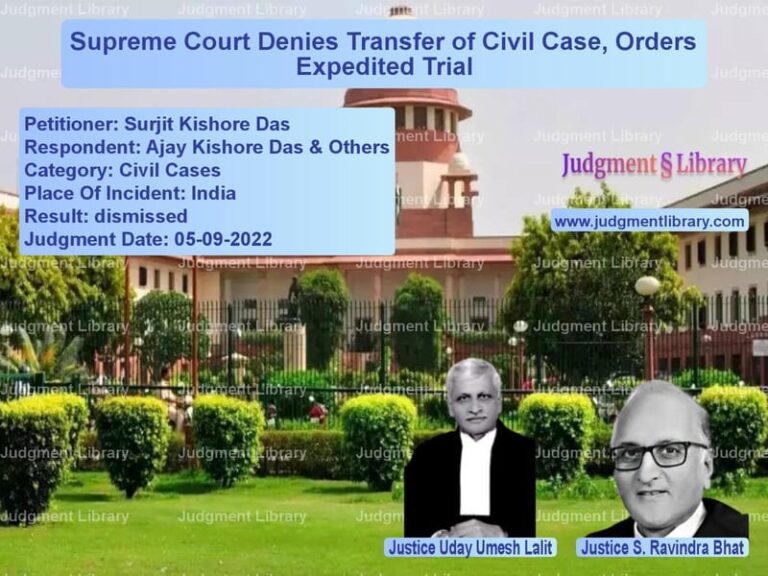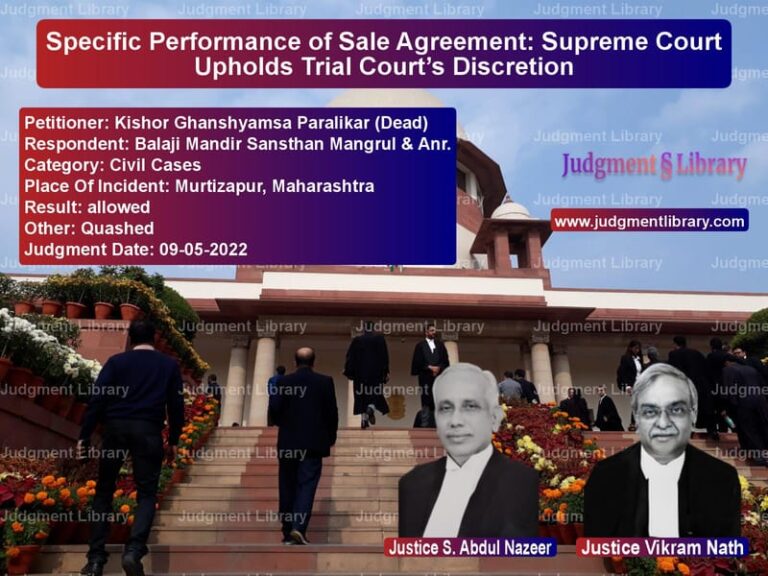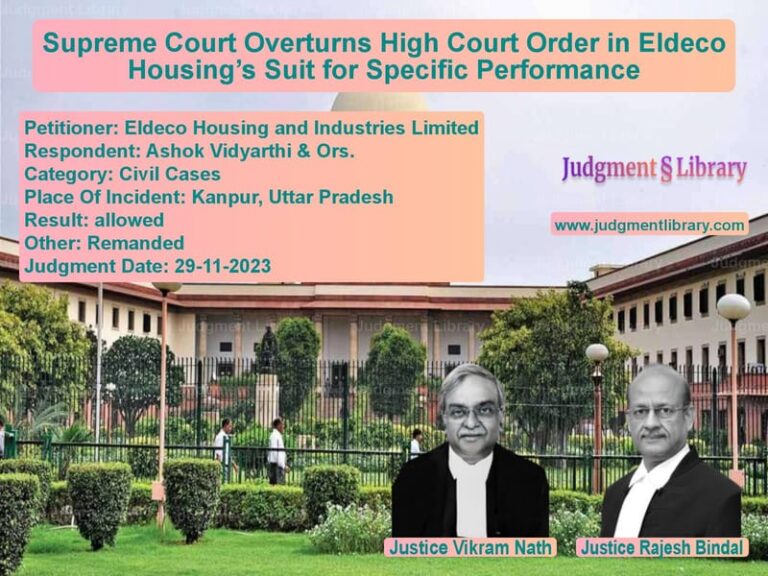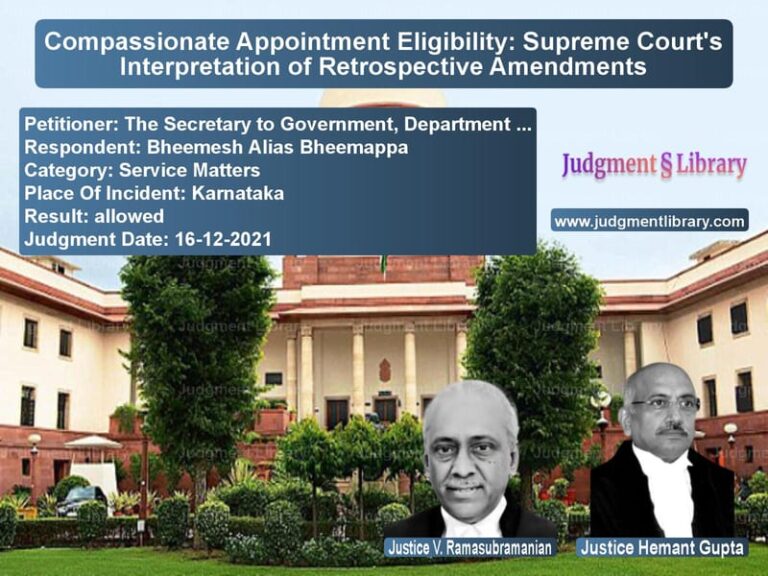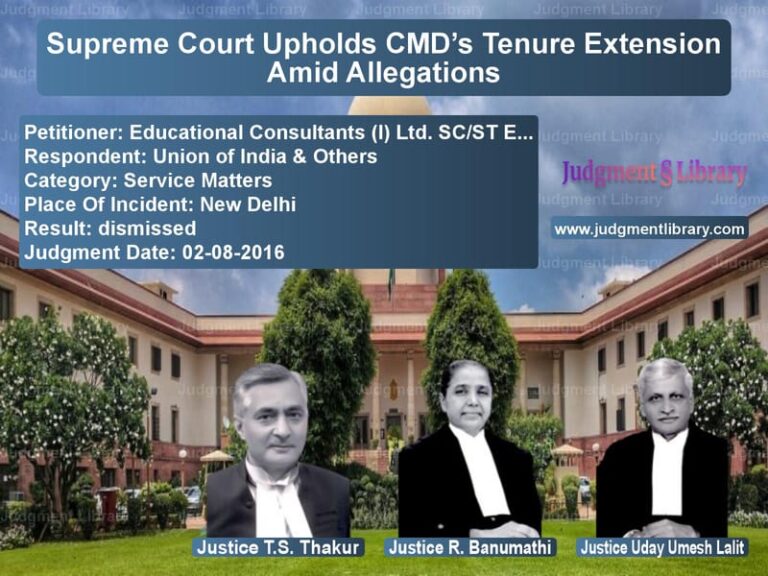Supreme Court Overturns High Court Decision on NIA Bail Cancellation
The Supreme Court of India recently ruled on the bail cancellation of several accused individuals in a case related to the Unlawful Activities (Prevention) Act, 1967 (UAPA). The case involved the National Investigation Agency (NIA) and appellants, including Kekhriesatuo Tep and others, who were accused of making payments under coercion to a banned organization. The Supreme Court overturned the Gauhati High Court’s decision that had canceled their bail, emphasizing the need to differentiate between coerced compliance and active participation in unlawful activities.
Background of the Case
The case originated from allegations that the appellants, who were government servants, had made payments to a banned organization operating in Nagaland. The NIA arrested them on October 13, 2017, and March 25, 2018. The Special NIA Court initially granted them bail, recognizing that the payments were made under duress and without criminal intent.
However, the NIA challenged this decision before the Gauhati High Court, which overturned the bail orders on May 8, 2018, and September 3, 2018. The High Court ruled that given the seriousness of the charges under UAPA, the accused were not entitled to bail. Subsequently, the appellants approached the Supreme Court, which stayed the High Court’s decision and conducted a detailed examination of the legal principles involved.
Petitioner’s Arguments (Kekhriesatuo Tep & Others)
- The payments to the banned organization were made under coercion and threat, not as voluntary support for unlawful activities.
- The NIA itself admitted that the accused were cooperating fully with the investigation and had voluntarily provided all necessary documents.
- The Special NIA Court had rightly differentiated between victims of extortion and those actively supporting outlawed organizations.
- There was no evidence suggesting that the accused were sympathizers or active members of the banned outfit.
- The prosecution failed to establish mens rea (criminal intent) to commit the offenses under UAPA.
Respondent’s Arguments (NIA)
- The NIA contended that the accused had made payments to the banned organization and that receipts bearing their signatures had been recovered.
- Under Section 43D(5) of UAPA, bail cannot be granted if a prima facie case is established against the accused.
- The High Court had correctly applied this provision by finding that the accused had committed an offense under UAPA.
- The gravity of offenses under UAPA warranted stricter bail conditions.
Supreme Court’s Observations
- The Special NIA Court had properly analyzed the difference between coerced payments and voluntary support for unlawful activities.
- The prosecution failed to establish that the accused had acted with the intention of furthering the activities of the banned organization.
- The High Court had misinterpreted the application of Section 43D(5) of UAPA by treating coerced payments as voluntary funding of terrorism.
- The Supreme Court reiterated that for an act to constitute an offense under UAPA, it must be done with criminal intent, which was absent in this case.
Key Judicial Precedents Cited
- Thwaha Fasal v. Union of India (2021 SCC OnLine SC 1000) – Held that mere association or forced compliance does not constitute an offense under UAPA unless there is clear intent to support unlawful activities.
- National Investigation Agency v. Zahoor Ahmad Shah Watali (2019) 5 SCC 1 – Distinguished between “not guilty” and “prima facie” in bail considerations under UAPA.
- Ranjitsing Brahmajeetsing Sharma v. State of Maharashtra (2005) 5 SCC 294 – Explained the necessity of proving intent in offenses involving national security laws.
Final Judgment
The Supreme Court ruled in favor of the appellants:
- The High Court’s decision canceling the bail was set aside.
- The Supreme Court reinstated the Special NIA Court’s bail orders.
- The Court emphasized that the distinction between extorted payments and voluntary contributions must be carefully considered in UAPA cases.
- It was clarified that the ruling does not affect the ongoing trial, and the accused must cooperate with the investigation.
Implications of the Judgment
The judgment sets an important precedent for future cases under UAPA:
- Judicial Review of Bail Under UAPA: Courts must carefully assess whether an accused’s actions were voluntary or made under coercion.
- Protection of Individual Rights: Mere compliance with extortionist demands does not automatically implicate a person in unlawful activities.
- Application of Section 43D(5): The ruling clarifies that a prima facie case under UAPA requires evidence of intent to further terrorism, not just financial transactions.
- Balance Between Security and Civil Liberties: The decision upholds national security concerns while ensuring that innocent individuals are not unjustly denied bail.
Conclusion
The Supreme Court’s ruling in Kekhriesatuo Tep & Others v. NIA provides crucial clarity on the application of UAPA in cases where individuals are forced to make payments to banned organizations. By reinstating the bail granted by the Special NIA Court, the judgment ensures that individuals coerced into compliance are not unfairly penalized. This decision reinforces the principle that courts must evaluate intent and coercion while applying stringent anti-terror laws.
Petitioner Name: Kekhriesatuo Tep & Others.Respondent Name: National Investigation Agency.Judgment By: Justice B.R. Gavai, Justice Sanjay Karol.Place Of Incident: Nagaland, India.Judgment Date: 12-04-2023.
Don’t miss out on the full details! Download the complete judgment in PDF format below and gain valuable insights instantly!
Download Judgment: kekhriesatuo-tep-&-o-vs-national-investigati-supreme-court-of-india-judgment-dated-12-04-2023.pdf
Directly Download Judgment: Directly download this Judgment
See all petitions in Bail and Anticipatory Bail
See all petitions in Custodial Deaths and Police Misconduct
See all petitions in Terrorist Activities
See all petitions in Judgment by B R Gavai
See all petitions in Judgment by Sanjay Karol
See all petitions in allowed
See all petitions in Quashed
See all petitions in supreme court of India judgments April 2023
See all petitions in 2023 judgments
See all posts in Criminal Cases Category
See all allowed petitions in Criminal Cases Category
See all Dismissed petitions in Criminal Cases Category
See all partially allowed petitions in Criminal Cases Category

